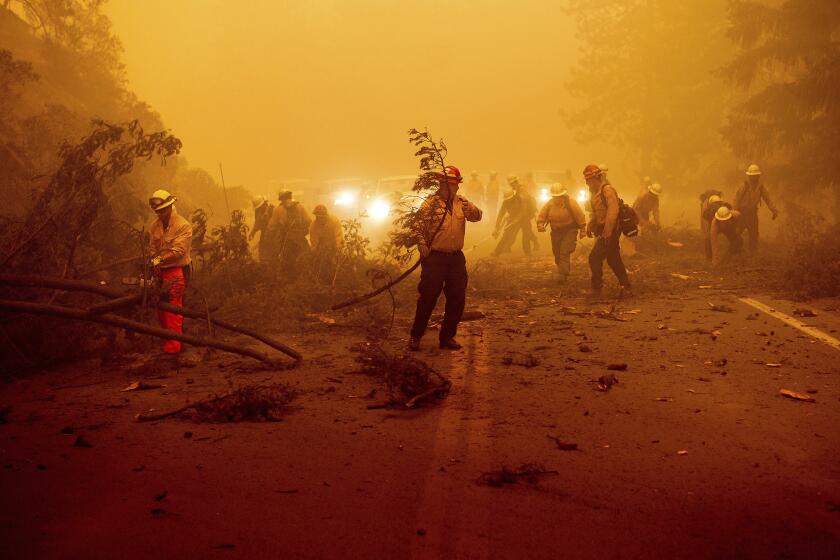Op-Ed: Why a mom’s Facebook warning about human traffickers hurts sex-trafficked kids

A viral Facebook entry about child sex trafficking posted by a concerned Southern California mom, Diandra Toyos, has reached tens of thousands of people through shares, likes and comments. Unfortunately it is a misinformed and ultimately harmful depiction of what this crime is about and how it happens in the United States.
In her post, Toyos relays the story of her family’s recent outing to Ikea, which was interrupted when two men followed her, her mother and her children through the store, despite their efforts to elude their pursuers. This was a terrifying incident and it reminds all of us of the need to be cognizant of our surroundings.
The problem is that Toyos framed herself and her family as “targets of human traffickers” in the post. There are zero indicators of human trafficking in Toyos’ story. Zero.
I wish I could say the post nonetheless will help make us all “better safe and vigilant” than sorry. In fact, I find that it so misrepresents the dangers, warning signs and risks associated with sex trafficking that its readers and likers may now try to protect kids by watching for the wrong things in the wrong places. They may miss real sex trafficking as it happens; they may miss the opportunity to extend a lifeline to child who needs their help. What people don’t understand about sex trafficking can prove lethal to kids.
Traffickers coerce and manipulate their victims, they don’t haul them off. Their tactics don’t leave bruises.
I’m a professional in the anti-trafficking field, and I have encountered thousands of child sex-trafficking cases in the United States. I have never seen, read or heard about a real sex-trafficking situation in which a child was abducted by traffickers in broad daylight at a busy store under a mother’s watchful eye. It’s just not the way it works.
Traffickers tend to coerce their victims because hauling them off is too risky. Their tactics generally aren’t the kind that leave physical bruises. Victims are recruited, manipulated, made dependent. The psychological and emotional ties they establish are highly effective. Trafficked children are unlikely to attempt escape.They often won’t snitch on their traffickers even if law enforcement approaches them.
Among common patterns of sex-trafficking recruitment and control: Parents or foster care parents selling their children. Or runaway, homeless youth, many of whom identify as LGBTQ, picked up at bus stops by traffickers who exploit their hunger and need for shelter. Or a young girl who falls in love with a man who says he loves her too, then pimps her out.
And while child sex trafficking can happen to anyone, children of color, children with a past history of sex abuse, children who come from broken or unstable homes, children who face poverty, and children with disabilities are especially vulnerable.
The most pernicious part of the viral Facebook post is its comments section. As sex-trafficking survivors and anti-trafficking advocates — myself included — tried to correct the misconceptions in it, and tried to alert the public to the harms caused by misunderstandings and sensationalism, we were met with anger and outrage.
Sound bite quotes and statistics were thrown back at me in an attempt to highlight my “ignorance” on the subject. “Human trafficking happens everywhere,” I was reminded. “It’s in our own backyards.” These are the exact phrases my colleagues and the anti-trafficking movement publicized years ago to raise awareness. We never imagined they’d be used to challenge our own expertise and in defense of efforts that threaten victims.
Worse, as the stalking story was praised by commenters, heart-breaking and accurate trafficking narratives, offered by survivors, got hijacked and undermined. Attempts to inform were interpreted as attacks on protective parents. Online, the truth was ridiculed, invalidated, silenced, shut down. All of this from people who claimed to care about child sex trafficking.
The public imagination too easily aligns with the kind of abduction fears portrayed in the Facebook post and in the comments that followed. Before you post such a tale, or like it or add a comment, do your homework. Think critically about what effect such narratives and responses may have on those most at-risk, on survivors and on real attempts to educate people and fight this terrible crime.
If you want to protect your children, listen to the messages of those who know this crime best. Pay attention to statistical reports, seek out the interest groups who are working on this issue, look at the evidence presented by survivors. Don’t let the understandable sympathy engendered by a scary story blind you to what sex trafficking is really about.
There are scores of people dedicated to keeping children safe, healthy and protected from the horrific reality of sex trafficking in our country. We care about victims and survivors. And we know what we’re talking about.
Lara Powers has been working to eradicate child sex trafficking for half a decade. She lives in Washington.
To read this article in Spanish, click here.
Follow the Opinion section on Twitter @latimesopinion and Facebook
MORE FROM OPINION
Donald Trump’s train-wreck presidency
Why Dodger Stadium should be the model for all sports venue deals
The Bundy family and followers are on trial again. Win or lose in court, theirs is a lost cause
More to Read
A cure for the common opinion
Get thought-provoking perspectives with our weekly newsletter.
You may occasionally receive promotional content from the Los Angeles Times.










